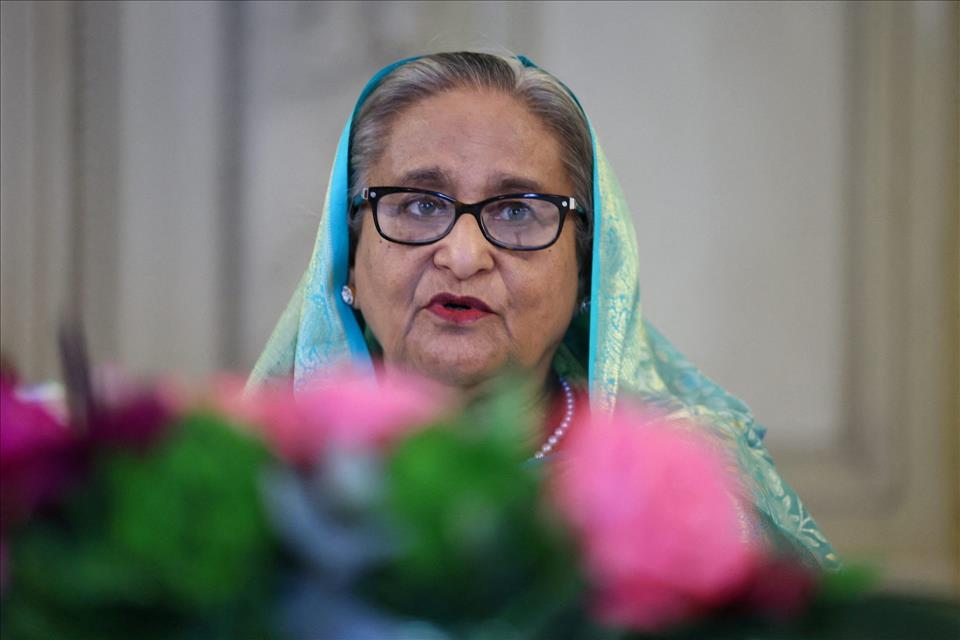
Could Bangladesh's Former Prime Minister, Sheikh Hasina, Be Extradited To The Country To Stand Trial?
Since then, at least 94 criminal cases have been lodged against Hasina and her cabinet members, followers and aides. The charges against them range from murder, torture, enforced disappearance and abduction, to crimes against humanity and genocide.
Courts do have the authority to hold a trial in Hasina's absence. But this is unlikely to be fruitful as there will be questions regarding fairness, due process and the motive behind the trial. At the same time, implementing the court's orders would be tough should Hasina not be present.
So, from the moment she escaped Bangladesh, there have been calls to extradite her to stand trial for the crimes that took place under her leadership. But it's far from certain whether India would hand her over should Bangladesh seek her extradition.
People carry a coffin covered with the Bangladesh national flag as they attend the funeral of two students who were killed during the unrest. Monirul Alam / EPA
Bangladesh can, in theory, request the return of Hasina from India. New Delhi and Dhaka signed an extradition treaty in 2013, which was subsequently amended in 2016 to simplify the process .
Both countries were eager for such a treaty . Two of the convicts involved in the 1975 assassination of Hasina's father, Sheikh Mujibur Rahman, who was also the first president of Bangladesh, were at the time hiding in India. Hasina's government wanted to extradite the men to Bangladesh for execution.
Some countries, like Canada , refuse to extradite fugitives if there is a possibility that they will be executed. However, as India also retains the death penalty, extradition was granted irrespective of whether the convicts would face execution on their return. The two men were handed over to Bangladesh in 2020
India, on the other hand, sought the handover of Anup Chetia, the general secretary of the banned United Liberation Front of Assam militant organisation. Chetia, who had spent 18 years in prison in Dhaka, was returned to India in 2015.
According to the treaty, only crimes for which the punishment is a minimum of one year in prison can be extraditable offences. And the offence must be punishable in both countries. The accusations against Hasina are prosecutable in India, and the punishments for her alleged crimes are also substantial, so she can be extradited on these grounds.
Article 10 of the treaty makes it even easier for the requesting country. It states that an arrest warrant issued from a court of law will be sufficient for the extradition without furnishing concrete proof of evidence against the offender. That said, no arrest warrant has been issued for Hasina at the time of writing.
Not a simple taskHowever, the treaty itself also contains several provisions that could enable India to refuse an appeal for Hasina's extradition. It could, for example, decline to return her on the grounds that the offences are political in nature.
It is generally accepted that extradition will be refused for political or military offences. This is justified by the need for states to remain detached from political conflict elsewhere, while also protecting the right of a state to grant asylum to political refugees.
The treaty does stipulate that an attempt to commit murder, manslaughter, kidnap, false imprisonment or incitement to murder shall not be regarded as political offences. And the charges brought against Hasina so far mostly fall under these categories.
But, even then, the treaty says a request can be denied if Indian courts determine that the accusation was not made in good faith or in the interests of justice. Courts may deny extradition if they believe Hasina would face political persecution, unfair trial or inhumane treatment upon her return to Bangladesh.
This will not be easy for Bangladesh to disprove. Some of the ministers from Hasina's government who have been arrested over recent weeks were physically assaulted by apparent bystanders when being taken to court, and reportedly did not get the opportunity to be represented by a lawyer .
Several murder cases have also been said to be registered out of anger and resentment . Some people, including cricketer and ousted lawmaker, Shakib Al Hasan , have been charged as instigators or abettors when it is unclear whether the actual culprits have been indicted or not.
As a result, there are plenty of concerns over Hasina's security and the fairness of any trial should she be returned to Bangladesh.
Protesters in Bangladesh demanding that Sheikh Hasina resigns. MDSABBIR/Shutterstock
If Hasina's safety is not guaranteed, then there is a chance she will be granted political asylum in India or elsewhere. Asylum would render the discussion of her extradition pointless as people with refugee status cannot be extradited. Sheikh Hasina has successfully obtained political asylum from India before, following the assassination of her father.
But her stay in India this time around has become complex. The interim government in Bangladesh has revoked diplomatic passports, including Hasina's.
She is now reportedly trying to seek asylum in one of the UK, United Arab Emirates, Saudi Arabia or Finland. However, her son, Sajeeb Wazed Joy, has told the press that Hasina has not yet sought asylum anywhere and will“certainly go back” to Bangladesh when elections are declared.
The treaty itself cannot guarantee extradition in all cases. In practice, it merely provides a legal framework for mutual cooperation. The ultimate decision may rely more on diplomatic negotiations and the political will of both governments than it will legal arguments.

Legal Disclaimer:
MENAFN provides the
information “as is” without warranty of any kind. We do not accept
any responsibility or liability for the accuracy, content, images,
videos, licenses, completeness, legality, or reliability of the information
contained in this article. If you have any complaints or copyright
issues related to this article, kindly contact the provider above.


















Comments
No comment